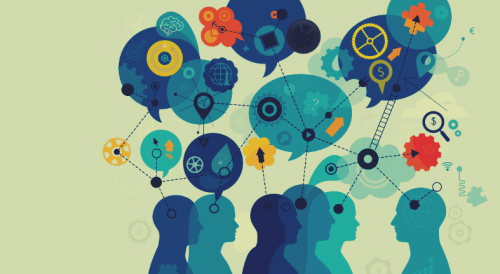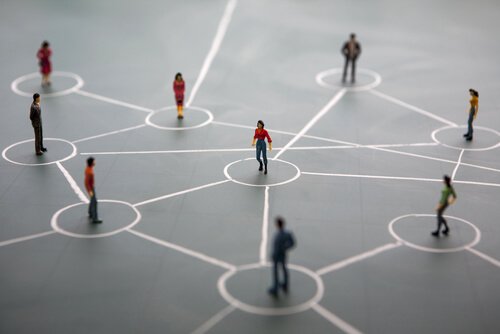Intelligence is a Collective Reality

The brightest moments in the history of mankind demonstrate that those we call “geniuses” aren’t usually isolated figures. Whenever one of those privileged minds appears, there are many men and women around them who also stand out intellectually. That’s why many affirm that intelligence is a collective reality.
The history of science is an example of this. The advances that certain scientists made would’ve been impossible without the help of others. Science has been a chain of discoveries. Without Copernicus, there would be no Newton. In turn, without Newton, there would be no Einstein.
This also happens in other areas. That’s why “golden ages” arise in every other field. By that, we refer to moments where a finding or proposal leads to many other geniuses simultaneously carrying out great advances or developments. This also occurs in smaller nuclei such as work environments, families, or groups of friends.

Intelligence is a Collective Reality
By coming into contact with intelligent minds, your intelligence is enhanced. No one can be truly intelligent while being completely isolated from the rest of the world. Those around us exert a big influence on our reasoning and problem-solving abilities. Whether you believe it or not, they stimulate or depress our intellect in some way.
Ideas are greater when we share them. Other people’s sense of rationality and sensitivity contribute to their creative growth. The intelligence of those surrounding us makes us smarter (and vice versa). When it comes to this, our environment per se is instrumental.
This reality has several consequences, though. The first and most important is to be aware of the links we establish with others. Not only will they affect our emotional life, but also our level of intelligence. The same goes the other way around. We help others be more or less intelligent. That being said, intelligence is undoubtedly a collective reality.

Stupidity Is Also Collective
We’re part of a community. This fact is engraved in our essence. However, the society where we currently live in focuses on individuals a lot more than on community. In fact, one of the ideals that many promote is individual feats, meaning doing something that leads someone to stand out above the rest so their name goes down in history.
The egoistic part of our being isn’t precisely the most intelligent. In fact, we come to the world selfishly. A baby can’t do anything other than live according to themselves and everything that meets their needs. So by sustaining selfishness as we grow older, we sustain the most primitive territories of ourselves.
Now, we understand that intelligence is a collective reality and that we’re always making ourselves and others more knowledgeable. However, some interests, on the other hand, promote collective stupidity. A lot of that stupidity consists in believing that our duty in the world is to seek the exaltation of our ego at all costs. Also, forgetting or overlooking the power of groups. Seeing society as a whole entity composed of individuals who only compete with each other; believing that the ultimate purpose is to impose ourselves.

Collaborative Intelligence
Jean Piaget established that one of the moral traits of those who have developed their intelligence at the highest level is the search for cooperative solutions. This implies having understood that we’re interdependent and that any individual good is inconsequential if it doesn’t benefit others as well.
Individual achievements create envious and ephemeral satisfaction. There’s a certain amount of latent aggressiveness in the desire to put others into an inferior scale so that we can stand out. This always has to do with feelings of inferiority and insecurities. We want to be above the rest in order to reaffirm that we’re worth it and that we can do whatever we want. However, that conviction fades away as quickly as it arises.
The greatest geniuses in history never refused to learn from others. Actually, it was quite the opposite. Those incredible minds were able to emerge and carry out their projects after considering other people’s. In fact, they used them as inspiration to build their own ideas. Also, they’ve always been so encouraged to move forward by the desire to solve universal problems instead of personal ones. That’s precisely one of the signs of their intelligence.
Although science is the greatest paradigm of collective intelligence, the same logic can apply to our day-to-day. How so? Understanding that we’re all part of the same adventure and solving conflicts to live a happier life.
“The measure of intelligence is the ability to change.”
-Albert Einstein-
The brightest moments in the history of mankind demonstrate that those we call “geniuses” aren’t usually isolated figures. Whenever one of those privileged minds appears, there are many men and women around them who also stand out intellectually. That’s why many affirm that intelligence is a collective reality.
The history of science is an example of this. The advances that certain scientists made would’ve been impossible without the help of others. Science has been a chain of discoveries. Without Copernicus, there would be no Newton. In turn, without Newton, there would be no Einstein.
This also happens in other areas. That’s why “golden ages” arise in every other field. By that, we refer to moments where a finding or proposal leads to many other geniuses simultaneously carrying out great advances or developments. This also occurs in smaller nuclei such as work environments, families, or groups of friends.

Intelligence is a Collective Reality
By coming into contact with intelligent minds, your intelligence is enhanced. No one can be truly intelligent while being completely isolated from the rest of the world. Those around us exert a big influence on our reasoning and problem-solving abilities. Whether you believe it or not, they stimulate or depress our intellect in some way.
Ideas are greater when we share them. Other people’s sense of rationality and sensitivity contribute to their creative growth. The intelligence of those surrounding us makes us smarter (and vice versa). When it comes to this, our environment per se is instrumental.
This reality has several consequences, though. The first and most important is to be aware of the links we establish with others. Not only will they affect our emotional life, but also our level of intelligence. The same goes the other way around. We help others be more or less intelligent. That being said, intelligence is undoubtedly a collective reality.

Stupidity Is Also Collective
We’re part of a community. This fact is engraved in our essence. However, the society where we currently live in focuses on individuals a lot more than on community. In fact, one of the ideals that many promote is individual feats, meaning doing something that leads someone to stand out above the rest so their name goes down in history.
The egoistic part of our being isn’t precisely the most intelligent. In fact, we come to the world selfishly. A baby can’t do anything other than live according to themselves and everything that meets their needs. So by sustaining selfishness as we grow older, we sustain the most primitive territories of ourselves.
Now, we understand that intelligence is a collective reality and that we’re always making ourselves and others more knowledgeable. However, some interests, on the other hand, promote collective stupidity. A lot of that stupidity consists in believing that our duty in the world is to seek the exaltation of our ego at all costs. Also, forgetting or overlooking the power of groups. Seeing society as a whole entity composed of individuals who only compete with each other; believing that the ultimate purpose is to impose ourselves.

Collaborative Intelligence
Jean Piaget established that one of the moral traits of those who have developed their intelligence at the highest level is the search for cooperative solutions. This implies having understood that we’re interdependent and that any individual good is inconsequential if it doesn’t benefit others as well.
Individual achievements create envious and ephemeral satisfaction. There’s a certain amount of latent aggressiveness in the desire to put others into an inferior scale so that we can stand out. This always has to do with feelings of inferiority and insecurities. We want to be above the rest in order to reaffirm that we’re worth it and that we can do whatever we want. However, that conviction fades away as quickly as it arises.
The greatest geniuses in history never refused to learn from others. Actually, it was quite the opposite. Those incredible minds were able to emerge and carry out their projects after considering other people’s. In fact, they used them as inspiration to build their own ideas. Also, they’ve always been so encouraged to move forward by the desire to solve universal problems instead of personal ones. That’s precisely one of the signs of their intelligence.
Although science is the greatest paradigm of collective intelligence, the same logic can apply to our day-to-day. How so? Understanding that we’re all part of the same adventure and solving conflicts to live a happier life.
“The measure of intelligence is the ability to change.”
-Albert Einstein-
This text is provided for informational purposes only and does not replace consultation with a professional. If in doubt, consult your specialist.







